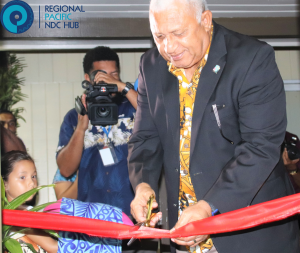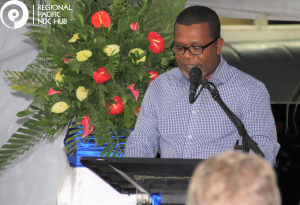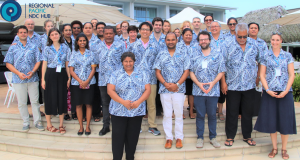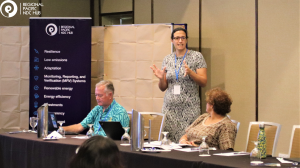
Fiji PM Hon. Voreqe Bainimarama opens the Pacific NDC Hub office.
On February 04, Fiji Prime Minister Hon. Voreqe Bainimarama officially opened the Regional Pacific Nationally Determined Contributions (NDC) Hub Office at the Pacific Community (SPC) campus in Suva, Fiji. This marked an important milestone for Pacific Island member countries determination to take a leading role in meeting the climate change targets set out in the Paris Agreement. The establishment of the Regional Pacific NDC Hub is a direct outcome of the Inaugural Climate Change Action Pacific Partnership (CAPP) Conference and was originally launched by the Prime Minister in 2017 at the 23rd Conference of Parties (COP23) in Bonn, Germany.
“We look forward to seeing the NDC Hub harness the might of Pacific cooperation in reviewing, enhancing and implementing our collective nationally determined contributions”, said PM Bainimarama. “The total carbon emissions from the Pacific is negligible but we cannot sit on our hands, and watch our future be saved from the side lines”.
The Global Green Growth Institute (GGGI) is an implementation partner of the NDC Hub and through GGGI, the NDC Hub is delivering support to Fiji, Kiribati and Tuvalu for the preparation of NDC implementation roadmaps, NDC investment plans and developing a projects pipeline as well as establishing an MRV (monitoring, reporting and verification) system in the Solomon Islands and the Marshall Islands – a core element that will enable both PICs to track the progress of their NDC implementation. Representing the Regional Pacific NDC Hub, Mr. Hudson Kauhiona, Director for Solomon Islands Ministry of Environment and Climate Change highlighted the “good support countries have been receiving from the Hub already”.

Mr. Hudson Kauhiona speaks at the office opening and highlights NDC Hub supports to the Solomon Islands and fellow PICs.
The realization of the Hub was made possible with the generous support of Germany, the United Kingdom, Australia and New Zealand. Mr. Philip Parham, UK Envoy to the Commonwealth also highlighted the NDC Hub’s work through his remarks during the launch – “we have already seen some of the progress the Hub has made, including creation of NDC Roadmaps, investment plans and project pipelines in Tuvalu and Kiribati; a climate change education programme in Nauru; and the establishment of a monitoring, reporting and verification system in Solomon Islands, to name just a few”.

Pacific Island country focal points, donors and implementation partners.
The Pacific NDC Hub also hosted a series of meetings as it is nearing completion of Phase 1 and gearing up to enter Phase 2 beginning April 2020. GGGI contributed in the week-long cooperation meeting with 15 Pacific Island Country (PIC) focal points and fellow partners. GIZ (lead partner), GGGI, SPC and SPREP contributed to designing a process timeline for planning and aligning tailor-made country support in implementing, enhancing and financing NDCs in the 15 Pacific Island member countries of the NDC Hub.

Ms. Katerina Syngellakis, GGGI’s Pacific Regional Representative, discusses effective regional and partner collaboration.
These planning meetings also offered a valuable platform for GGGI to present its values, contributing richly to the discussions and decision making on the table. GGGI also highlighted the activities it is delivering during the first phase in Fiji, Kiribati, Tuvalu, Solomon Islands and Marshall Islands. As an implementation partner of the Regional Pacific NDC Hub, GGGI has expanded its reach and is providing valuable and timely support for inclusive green growth to GGGI non-member countries as well.
The Regional Pacific NDC Hub is implemented through a partnership between the Deutsche Gesellschaft für Internationale Zusammenarbeit (GIZ), the Global Green Growth Institute (GGGI), the Pacific Community (SPC) and the Secretariat of the Pacific Regional Environment Programme (SPREP) in contribution to the NDC Partnership, with financial support from Germany, United Kingdom, Australian and New Zealand Governments.